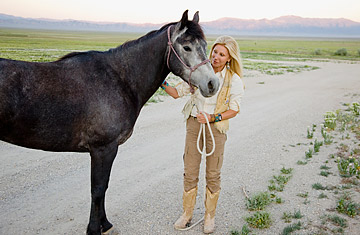
Madeleine Pickens, wife of billionaire T. Boone Pickens, on her ranch in Elko, Nev. She intends to turn the ranch, which already has 500 horses, into a wild-horse sanctuary
(2 of 2)
Back in the sagebrush, Pickens grabs an armful of fresh-cut hay and walks boldly toward a wild stallion, black with a splash of white between its wary eyes. The stallion was gelded a few days before and is understandably skittish, retreating from her fearless advance. "Riding isn't a big part of my life," says Pickens, who was born in Iraq to a British father and a Lebanese mother. "I used to watch [the TV horse opera] Bonanza, and when I came to America, I saw that the things I loved about it — like the mustangs — were being destroyed."
Pickens has always had a soft spot for animals. After Hurricane Katrina in 2005, she and her husband arranged six airlifts for 800 stranded dogs and cats. Pickens says this gave her a direct, emotional satisfaction she never got by just writing checks for charity. Then an animal activist drew her attention to the plight of wild mustangs.
Brought to North America by the Spanish conquistadors in the 16th century, the horses thrived in the boundless, grassy plains of the West. Estimates in the early 1900s put the number of wild horses at over 2 million, but by the 1960s, the herds were on their way to extinction, with only 17,000 mustangs left. Herds were being rounded up and butchered. Domestic horses were not spared slaughter: even tottering old thoroughbreds ended up being sold for horseflesh. Today the BLM reckons that there are more than 33,000 horses in the wild, far too many, the agency insists.
This struck a chord with Pickens. With her first husband, the late Gulfstream Aerospace founder Allen Paulson, she had bred racehorses. "The Japanese actually made a big deal of eating a Kentucky Derby winner named Ferdinand," says Pickens, who is a dainty vegetarian. "I was horrified."
Her Bonanza-inspired spiritual quest to save America's mustangs belies the fact that Pickens is an astute operator. As T. Boone Pickens tells TIME, "When Madeleine sets her sights on something, you best get on board or get out of the way. She makes things happen. I'm amazed by her passion for horses and preserving this critical piece of America's heritage."
A formidable duo, the billionaire couple lobbied Congress successfully in 2007 to ban horse slaughter in the U.S. Consequently, many horses are trucked over the border to Canada and Mexico to be butchered and exported to Japan and Europe, where horse meat is a prized delicacy. In 2008, the BLM announced that it was considering a massive cull of wild horses. The BLM backed off on this due to public outrage, but it spurred Pickens into action nonetheless. In 2011, she closed on two adjacent Nevada ranches for her eco-sanctuary, a place where mustangs could roam free and the public could watch these equine icons of the Wild West.
The BLM keeps more than 41,700 horses in captivity. More than 15,000 are crammed into corrals, "butt to butt," says Pickens, while the others are kept in long-term pastures, costing taxpayers about $70 million a year to feed and care for the animals. "Forget about sentiment. You're talking about $70 million for a government that's busted," she argues. "I can look after mustangs more cheaply and humanely."
Prodded by the cattlemen, the BLM rounds up thousands of wild horses every year, using helicopters that swoop low over the stampeding herds and drive them until they are so exhausted, they can be easily caught. The BLM says more than 33,000 mustangs and wild burros still roam free, more than can be sustained by the available pasture, but animal-rights activists dispute this. Says Heyde: "There are 8 million cattle and sheep on government land, and yet a few horses get blamed for everything."
Pickens knows that even with her fortune, she can't save all of America's mustangs. With pasture sparse, even her massive ranch can handle only 1,800 mustangs. But she insists that her eco-sanctuary will serve as a model for other reserves where horses can run free and that the size of the herd can be managed. With no predators and ample food, a herd of mustangs can double in size in five years, a prospect that scares cattle ranchers. Steve Boyce, a former President of the Nevada Cattleman's Association, says, "We're made out to be the bad guys here. But there's a limited amount of forage out there. In the winter, it's all frozen out. We're worried that if the horses aren't gathered, they'll eat the pasture for our cattle."
A helicopter buzzes down to chauffeur Pickens on an aerial tour of her property. She is joined by Tommy, her pet dachshund, who is so accustomed to his mistress's jet-set lifestyle that, as soon as the helicopter roars skyward, he falls asleep in her lap. The helicopter banks over juniper-clad mountains, into the high meadows. And there below is a herd of mustangs, racing along the mountain ridge, wild and free-spirited. "To me, these mustangs are emblematic of America's freedom," Pickens says later. "And they're ending up on dinner plates in Japan and Europe."
Tim McGirk is a former TIME bureau chief and is currently a fellow at the Investigative Reporting Program at the University of California, Berkeley, Graduate School of Journalism.
